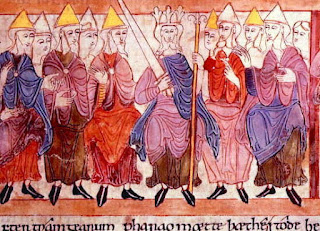 |
| Edgar and his sister, St. Margaret, landing at Wearmouth after their ship was blown off course |
Edward the Confessor supposedly saw the impending trouble with succession to the throne of England and saw a way out: he had a nephew who was the legitimate heir: Edward (1016-1057), called "the Exile, who had fled to Hungary after being ousted from England after the defeat of his father (Edmund II "Ironside," c.989-1016) by King Cnut. Edward the Confessor had called Edward the Exile back to England to make him his heir. Sadly, the Exile died very soon after his arrival back in England in 1057. History does not record a reason, but it is possible that he was eliminated by the Godwinsons, who were very powerful and wanted to see Harold succeed to the throne.
Edward the Exile had left children behind on the continent, however. Edgar the Ætheling (c.1051-c.1126) was only a teen in 1066, but his youth was no bar to the succession. The witenagemot, the council of wise men that approved the succession in Anglo-Saxon England, met in London and chose Edgar as king the day after Harold fell at Hastings, and sent for him to return to England and lead the opposition to William of Normandy.
The men who chose him, however, chose not to defend their choice and resist William as his forces approached; instead, they negotiated with William for a peaceful turnover of the kingdom. In December, the aristocracy of England met with William at Berkhamstead to submit themselves to his rule and hand over Edgar. William took Edgar and some other English leaders into custody in order to ensure future cooperation.
In 1068, Edgar fled captivity with his mother and two sisters (Margaret and Cristina) to return to Hungary, but their ship was blown off course and landed in the north of England, where they were taken in by Malcolm* III Canmore, king of Scotland. Malcolm married Edward's sister Margaret (who later became Saint Margaret). Edgar had an "on again, off again" relationship with William and an adventure-filled life. He was still alive in 1125 according to William of Malmesbury, so his date of death assumed to be c.1126.
*Malcolm was the model for the character in Shakespeare's MacBeth.
